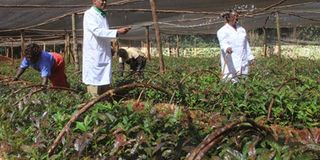Purple tea seedlings bring fresh opportunities

Dustan Ngumo, (left) the director of Ragati Tea Factory in Nyeri and other workers on the farm. PHOTO | JOSEPH KANYI |
What you need to know:
- Ngumo grows the seedlings whose demand is going up as many farmers turn to the variety.
The tea farm on the slopes of Mt Kenya towers above the rest in the region because of a new variety the owners are growing.
Workers can be seen picking tea leaves as others water seedlings in a greenhouse.
Tea farmers have been battered by bad weather, rising cost of inputs and a glut in the international market, which in turn has reduced their earnings.
However, these challenges do not worry workers and the owners of the farm named Ragati Tea Factory in Mathira, Nyeri as they have embraced the purple tea variety.
Dustan Ngumo, the director of the factory, says with purple tea, fortunes in the industry for farmers and processors are slowly changing.
“This tea variety matures faster and has a better market compared to the green tea that we have been growing for many years. Many farmers and factories now peg their hopes on the tea.”
Ngumo has grown over 300,000 purple tea seedlings that he sells at Sh15 each to farmers when the long rains start.
“This tea variety is ready for harvesting in two years unlike the green one that takes three years before it is plucked. It also earns the farmer up to four times more.”
Currently, he has clients not only from the Mt Kenya region but also Kericho and Bomet counties.
HIGH-YIELDING
The new clone, TRFK306/1, is drought and frost resistant, high-yielding and will grow in similar weather conditions as the green tea.
“I do not regret venturing into the propagation of purple tea and growing the crop itself. So far I am happy with the outcome and I know there is enough demand to accommodate all those who are interested,” says Ngumo.
He notes that the changing weather pattern and the glut in the market, which has discouraged many farmers from growing green tea can be reversed if they embrace the new variety.
Currently, Kenya produces and exports over 96 per cent of the black teas. The tea is sold in the world market in bulk and hence is largely used for blending lower quality teas from other countries.
Consequently, it fetches low prices and, therefore, depressed revenue for tea growers in particular and low foreign exchange for the country.
“If we grow purple tea and then add value, there will be less to supply at the Mombasa auction, meaning that the market forces will push the prices up, yielding better returns.”
In the recent past, turbulence in high tea consuming countries in North Africa like Egypt have seen low demand for Kenyan tea, leading to oversupply at the auction.
Ngumi says purple tea is a brilliant response to a changing climate and is resistant to frost, diseases and pests. Purple tea is a green alternative for tea drinkers, he adds.
The tea is anthocyanin rich, which means it has super high levels of antioxidants. The most prominent anti-oxidant is malvidin, which is also found in red grapes, wine, blueberries, and raspberries.





